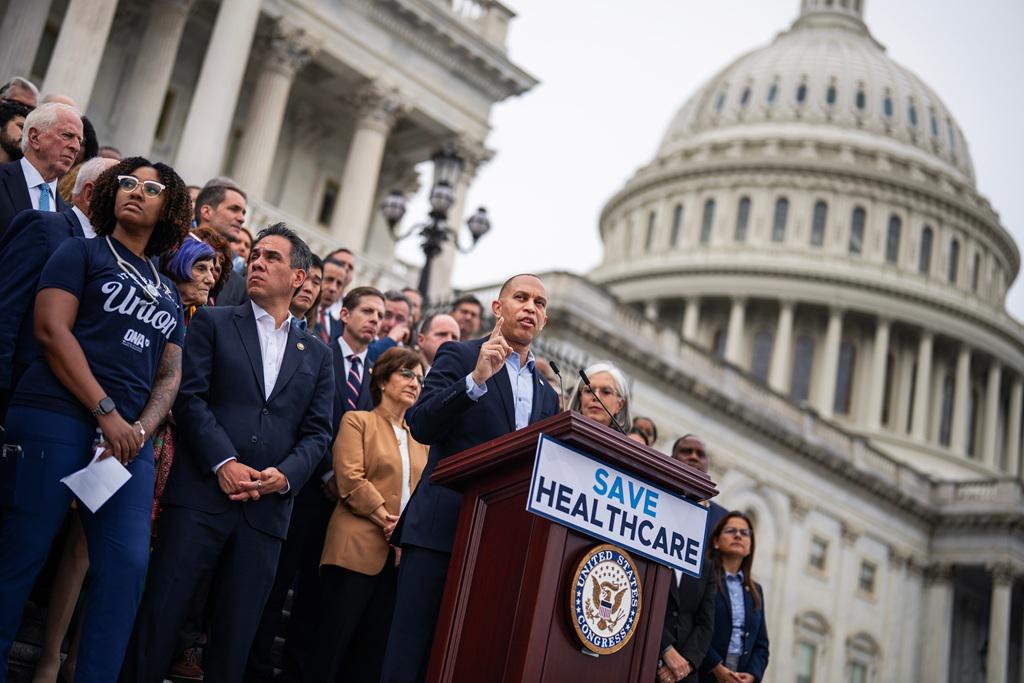By Ryan Cooper
Copyright prospect

The government is shut down as of 12:01 a.m. Wednesday—or at least that is the narrative coming out of the mainstream press. In reality, as my colleagues David Dayen and Whitney Wimbish point out, the government has been effectively shut down since Donald Trump took office in January.
Moreover, there is something strange about this whole song and dance. The reactionary Supreme Court majority, in one of their signature unsigned and barely argued rulings, recently allowed Trump to impound $4 billion in foreign aid spending. That’s not very much money, but combined with the Court’s other behavior, it clearly implies that as far as the nation’s top court is concerned, Trump has plenary powers over the budget. He can spend taxpayer money in any way he wishes.
It follows that Trump could end any “shutdown” immediately by just directing the agencies to reopen and the money to be spent. John Roberts certainly isn’t going to stop him. Is House Speaker Mike Johnson? Please.
It illustrates what is really at stake here—not health care subsidies by themselves, important as they may be, but the basic principles of American democracy, which Trump is trying to destroy with the willing participation of the Republican majority on the Supreme Court.
As Amy Howe at SCOTUSblog explains, the details of the foreign aid decision are complicated, but it boils down to Trump trying to do an end run around the Impoundment Control Act when it comes to spending he doesn’t like. The term of art that’s been used is a “pocket rescission.” Technically speaking, the executive branch can announce a rescission of funds that pauses them for 45 days, but if Congress doesn’t approve the rescission by then, the money must be spent. But Trump and his minion at the Office of Management and Budget, Russ Vought, issued this $4 billion rescission less than 45 days before the end of the fiscal year. So, Trump and Vought reasoned, they could cancel this $4 billion in spending without congressional approval.
A lower court had previously ruled that Trump and Vought’s attempt to rescind funds without congressional input was illegal, and gave Trump until September 30 to restore the funding, because that’s the end of the fiscal year. The majority, in a short, unsigned opinion, has now stayed that ruling past that date, with little explanation other than a vague sentiment that the parties who sued did not have the proper standing and couldn’t show a severe enough injury. The “asserted harms to the Executive’s conduct of foreign affairs appear to outweigh the potential harm faced by respondents,” it says.
Even though the majority claims that the “order should not be read as a final determination on the merits,” as a palpably exhausted dissent by Justice Elena Kagan points out, in reality it will “prevent the funds from reaching their intended recipients—not just now but (because of their impending expiration) for all time.” As for Trump disagreeing with the spending, Kagan said, “that is just the price of living under a Constitution that gives Congress the power to make spending decisions through the enactment of appropriations laws.”
This isn’t the first time that the Court has allowed Trump to arrogate Congress’s power of the purse to himself.
One harm created by Trump’s “conduct of foreign affairs,” by the way, is the estimated 525,000 people—354,000 of them children—who have died at the time of writing because Trump and Elon Musk illegally shut off so much humanitarian aid.
But this kind of up-is-down “argument” from right-wing justices is nothing new. This isn’t the first time that the Court has allowed Trump to arrogate Congress’s power of the purse to himself. He’s also just withheld an estimated $410 billion from other programs, almost half of all nondefense discretionary spending in the fiscal year 2025 budget, and the Court has let him do it. Most importantly, in Trump v. United States—an appropriately named decision if ever there was one—Roberts anointed Trump as a de facto king, formally immune from prosecution for crimes committed in office.
In some ways, the behavior of this Court is clarifying. After decades of arguments about whether “originalism,” or “textualism,” or some other form of analysis is the correct way to interpret the Constitution, it turns out the actual way conservatives judge the law is very simple. I call it (borrowed from Michael Liroff) the Special Boy legal school of thought. It holds that Donald Trump is America’s most Special Boy, and nothing whatsoever can be allowed to interfere with any of the Special Boy’s goals or cause him a moment’s discomfort.
The Constitution, law, precedent, scientific principles, logical consistency, or plain common sense—none of these things can stand in the way of the Special Boy being able to do whatever he wants, all the time. That’s why John Roberts deleted most of Article II to prevent Trump from being thrown in jail for his attempted putsch. That’s why they’ve now deleted Article I, Section 7, so Trump doesn’t have to spend money if he doesn’t want to. And that’s why the Court has come to lean on unsigned shadow docket rulings—what the Special Boy wants is routinely so preposterously illegal that not even these hack frauds can string together a couple of coherent paragraphs to justify it. Better to quietly rule by decree and then shout at lower courts when they complain that your decisions make no sense.
Now, I must admit that on the narrow question of whether government shutdowns are legally mandated, there is strong reason to think that they are not. The possibility did not even exist until Jimmy Carter’s attorney general made it up in 1980. If Trump gets rid of them forever, I can’t say that I care.
But the shutdown is a golden opportunity to point out the stakes of what is happening. Congressional Democrats have characteristically tried to make this entirely about health care, but the reality is much more consequential. This is about Donald Trump shredding any semblance of America’s democratic republic, with the complete support of his corrupt regime toadies on the Supreme Court and in Congress.
Trying to cut a deal with Trump to preserve Affordable Care Act subsidies, as Sen. Dick Durbin (D-IL) has urged, is both blinkered—what’s the point of making a deal with a compulsive betrayer who can easily renege, with no cost?—and a missed opportunity. Better to start a fight over basic principles of constitutional government, and thereby draw attention both to Trump’s authoritarianism and to the vital importance of breaking the power of the reactionary Supreme Court, whose decisions have about as much relationship to the law and Constitution as the contents of my cat’s litter box.
Ordinary people seem to understand this better than a lot of Democratic senators. When a recent poll by Blueprint Research asked if voters agreed with Democrats in saying “Republicans are to blame for a shutdown because Republicans have allowed Trump to trample American democracy,” they got 50 percent agreement, with just 35 percent disagreeing. That was the same number who agreed with Democrats saying Republicans are shutting down the government to take away people’s health care, even though that has been the sum total of the message and nobody has heard much of anything about this destruction of the congressional power of the purse.
As Helen, a former federal worker who was pushed out by Trump in April and attended a sit-in on Capitol Hill on Tuesday, told the Prospect: “We are there. There is no doubt. We are in full authoritarianism under the Trump regime. [Democrats] need to act like it. It has not been business as usual and they need to stop acting like it is.”
Whitney Curry Wimbish contributed reporting.



